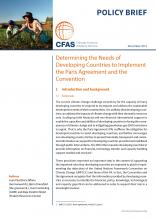
The current climate change challenge exceeds by far the capacity of many developing countries to respond to its impacts and address the sustainable development needs of their communities. It is unlikely that developing countries can address the impacts of climate change with their domestic resources only. Scaling-up both financial and non-financial international support to enable the capacities and abilities of developing countries to facing the consequences of climate change and to mitigating greenhouse gas (GHG) emissions is urgent. That is why the Paris Agreement (PA) reaffirms the obligation for developed countries to assist developing countries, and further encourages non-developing country Parties to present biennially transparent and consistent information on support for developing countries provided and mobilized through public interventions. The PA further requests developing countries to provide information on financial, technology transfer and capacity building support needed and received.
These provisions represent an important step in the context of supporting the important roles that developing countries are expected to play for implementing the objectives of the United Nations Framework Convention on Climate Change (UNFCCC) and those of the PA. In fact, the Convention and the Agreement recognize that the information provided by developing countries
is necessary to identify the financial, policy, knowledge, technological and capacity gaps that can be addressed in order to support their role in a meaningful manner.
Recognising these gaps, developed countries have committed to support developing countries’ efforts by providing them with the necessary finance, knowledge, technology development and transfer, assistance on policy reform as well as capacity building. To meet such an important commitment, a first step is, therefore, to determine the needs of developing country Parties in
order to analyse them with the view to strengthen their role and make it consistent with the objectives of the Convention and PA.



